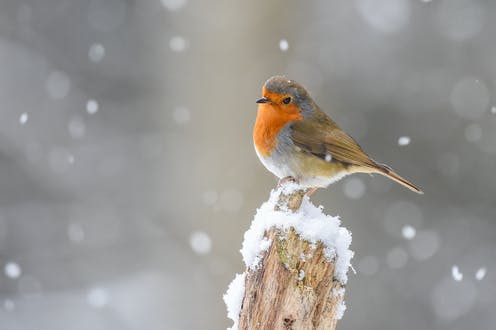shutterstock
During the pandemic, many Britons picked up a backyard birdwatching hobby. Birds provide endless entertainment, from the captivating mechanics of flight to their fascinating names. Many species of bird have come to be strongly associated with certain times of year. In Britain, the festive season is marked by the appearance of robins, both in trees and on Christmas cards.
A glimpse behind the names of Britain’s favourite Christmastime birds tells us a lot about how historical speakers of English perceived and thought about these birds.
Robin
This charming bird is a familiar sight in any season. Between its brightly coloured breast, its unusual behaviour of singing year round, and the way it brazenly patrols its territory, it is impossible to ignore.
While Britain’s love for this bird goes way back (even Chaucer remarks affectionately on the robin in his poem Parliament of Fowls) its name does not. In the later Middle Ages, it was a sign of fondness to name birds after humans: robins were called Robert, Robinet, Roberd and Robin, and wrens were called Jenny. It survives today in magpie, a clipped form of Margot the pye (where pye was the original name for the bird affectionately called Margot), as well as in the birds we call martins (such as the house martin and sand martin).
The original name for the robin, dating back to as early as 600 AD, was ruddock, and it is still known by that name in some places today. This comes from the Old English word for red (ræd) – historical speakers of English were clearly just as enamoured by the bird’s bright breast.
Nuthatch
Like the robin, the nuthatch is a year-round resident which is particularly conspicuous in the festive season. It stands out against the December landscape –- this is when nuthatches venture into gardens to forage from birdfeeders. It is also the time of the year when they start to sing.
The “nut” in nuthatch is simple enough: this is their favourite food. There is no “hatching” involved, however – just old-fashioned “hacking” away at the nuts as they eat them. The second word is the same as today’s “hack”, but preserving the Old English form hæcce (pronounced “hatch”).
Blue tit
This tiny bird is a staple on Christmas cards and festive decorations. The blue is self-explanatory, but the second element, which refers to an entire family of birds (paridae or tits) has a surprisingly convoluted history.
“Tit” is a shortening of “titmouse”, still the term used in North America for a similar kind of small bird. In Middle English it was titmose, though speakers ended up confusing mose with the more common word “mouse”. This is what led to the second element being dropped – as these were small birds, not mice.
However, “titmouse” was actually two words put together, and the second part is the oldest name for what we now call tits. In Old English, that word was mase. It survives today in German (meise) and Dutch (mees), in all cases referring to these tiny songbirds.
At some point, speakers playfully added onomatopoeia to the name – they thought that “tit” captured the birds’ squeaky sounds. We get something similar with jackdaw, which was originally called a daw and which early speakers characterised as making a “jack” noise. This would be like calling a cow a “moo-cow”.
Blackbird
The meaning of the blackbird’s most common name is pretty obvious. Less well-known is that the blackbird features in the popular carol The Twelve Days of Christmas. The “four calling birds” we sing about are a relatively recent reinterpretation of the older line “four colly birds”, which is nonsensical to most modern speakers.
“Colly” is an old variant form of “coaly”, (coal-coloured). While there are many dark-coloured birds in the UK, we can be sure that the carol is referring to blackbirds here because in some places, such as in the southwest of England, “colly” or “colly bird” is still used.
 Four blackbirds, or ‘colly’ birds, are among the many feathered friends that feature in Christmas carols. Ihor Hvozdetskyi / Shutterstock
Four blackbirds, or ‘colly’ birds, are among the many feathered friends that feature in Christmas carols. Ihor Hvozdetskyi / Shutterstock
Turtle dove
It is strange that turtle doves are so closely associated with Christmas because they are summer visitors to the British Isles. The culprit for this association is The Twelve Days of Christmas –- a carol which, on the whole, has very little care for ornithological fact judging from this and from the presence of the ground-dwelling partridge in a pear tree.
The carol does do justice to the birds, however, by making sure the turtle doves are in a pair. Turtle doves are well known for their strong pair bonds, and they have become icons of devoted love for this reason. Appropriately, this bird’s name represents the conjoining of two different languages.
Turtle doves have nothing to do with the reptile – this is an Old English rendering of the Latin name for the bird, turtur, which sought to imitate its purring call. When the word was first used in English, the bird was merely called turtla.
The word “dove” was added later, probably to clarify what sort of animal the turtla was. Dove goes back to a native Old English word dufa, meaning “diver”. Pigeons and doves (which are the same bird) were called this because of their forceful swooping flight, powered by their massive pectoral muscles.
The name turtle dove came to mean “the dove which makes tur-tle noises”. In earlier times, when nature didn’t have to compete with the sounds of traffic, phones and tools, people were just as likely to name birds for their sounds as they were for their appearance, because birds were experienced aurally as much as they were visually.
![]()
Eric Lacey works for the University of Winchester. He has received funding from the Arts and Humanities Research Council (then known as the AHRB).




